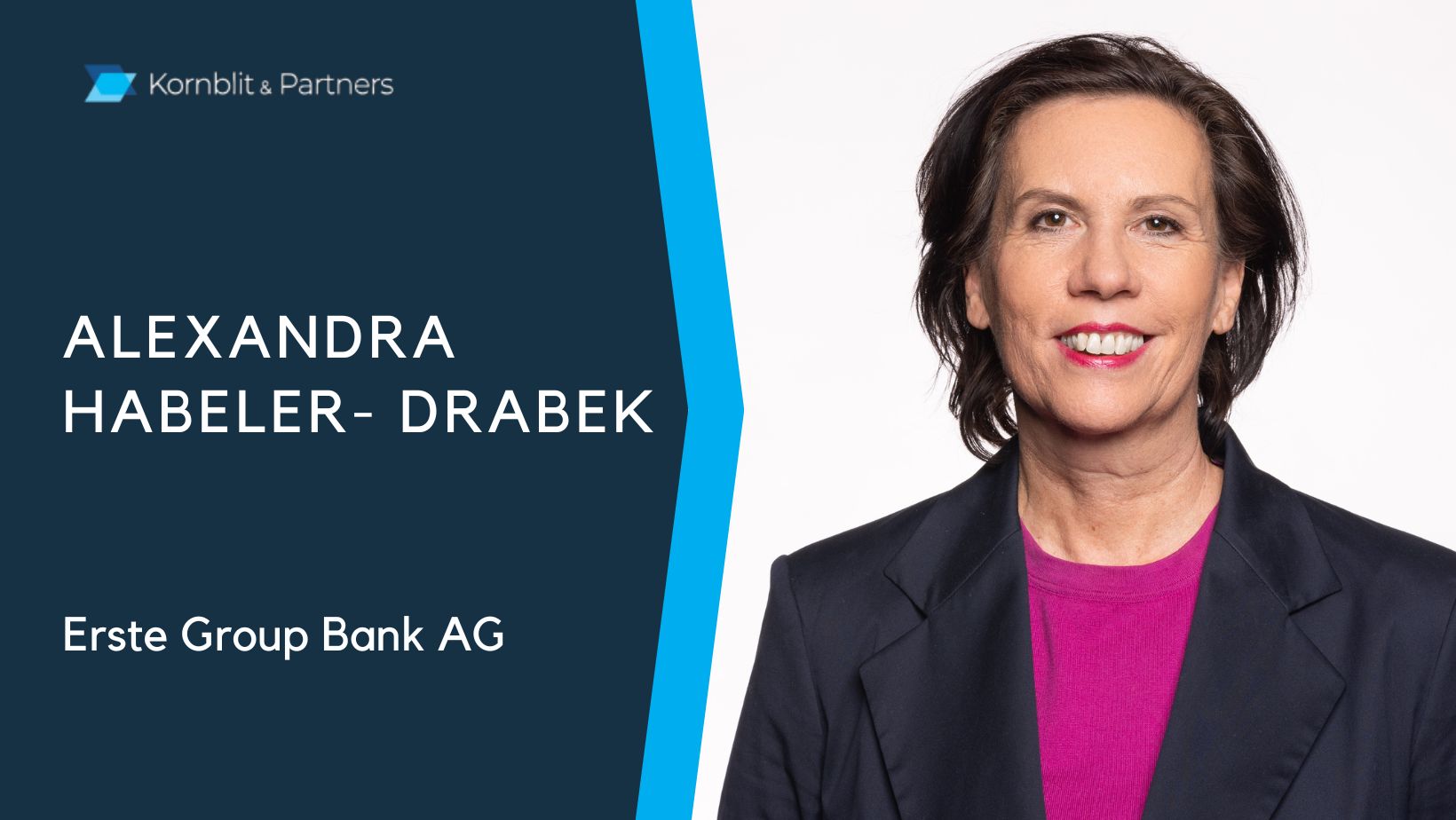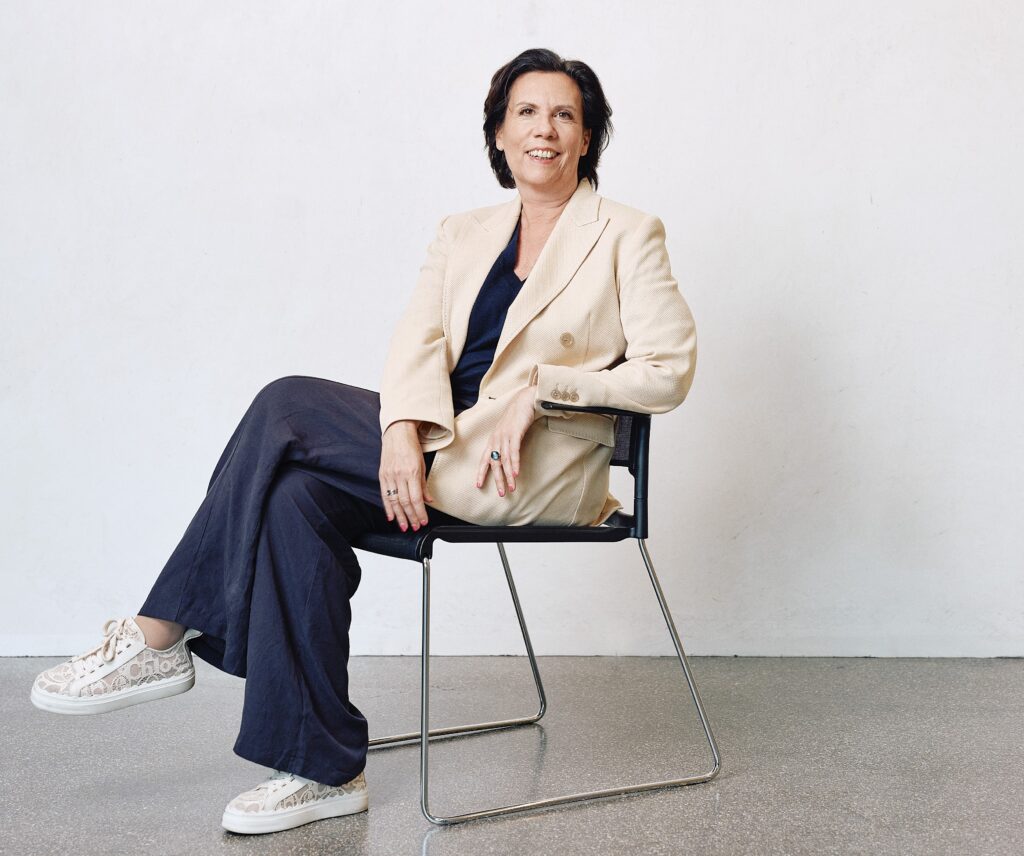
Magdalena Tokaj, Kornblit & Partners Executive Search: Alexandra, what would you say has been the key to your success? Tell us about motivations that guided you in building your career path? Were there any experiences that served you as turning points in your career?
Alexandra Habeler-Drabek, Chief Risk Officer, Member of the Management Board, Erste Group Bank AG: There are some vital traits that are true for both men and women: hard work, building trustworthy relationships and a bit of luck. In other words, you have to be in the right place at the right time sometimes. Not everything is always in your personal area of influence.
In regard to my personal motivation, I have always wanted to be in charge. When I started at Creditanstalt Bank as a junior, I had a lot of superiors and a lot of decisions I had to align. I considered this a little tiring, so I wanted to be promoted as fast as possible in order to make my own decisions. Something else that I learnt very early – particularly in working with restructuring issues: You have to be able to deliver unpleasant news, and you are negotiating with clients in difficult financial situations. That was a lesson I had to adapt to quickly, which essentially taught me personal responsibility ownership. Not to hide behind your superiors and rules but to communicate transparently, openly and respectfully. In German there’s a saying “everyone deserves to be told the truth.” With this principle I succeeded in being respectful in a very honest way, which was a very important value for me.
“Everyone deserves to be told the truth.” With this principle I succeeded in being respectful in a very honest way, which was a very important value for me.
A strong additional motivator for me was always working with people. I wouldn’t be motivated only sitting at my desk with no social interaction. I thrive in constant contact and interaction with others. This is why in my current position I try to meet clients from time to time.
Sabina Kornblit, Kornblit & Partners Executive Search: From your point of view – as an experienced leader and board member – what are the greatest challenges for women regarding career development?
Alexandra Habeler-Drabek: It’s still a fact, women tend to underestimate their value and abilities. I can tell you a very personal story of mine: I was B-1, already a senior manager and I was offered to switch to another field with wider influence in risk management. My first reaction was “but I don’t know this and that, I’ve never done this and that before”. The Chief Risk Officer who was the hiring manager for that position just said to me: “Yes, but at the same time you know this and you’ve done that before. You can do this”. In the end, we were both right. He was aware of my weaknesses, but in the first place he focused on my strengths.
In the end, we were both right. He was aware of my weaknesses, but in the first place he focused on my strengths.
This is something I believe men can do better – to focus successfully on their strengths instead of ruminating on weaknesses. It’s not about overestimating yourself but about being aware of your strengths and focusing on them. This is something women still tend to forget about, even those most ambitious and engaged. Consequently, we still need more support than men to apply for higher positions. I always encourage my B-1s to be brave and focused on personal strengths.
This is something we also promote across the bank. We actively encourage women to apply for next level positions. We take it very seriously creating a pool of candidates, properly balancing the share of women and men. Of course, this takes time, and it is not always possible for a specific position. But if you take your time, if you take a broader look, you will find great female candidates for the right position.
Sabina Kornblit: It’s great to hear that more and more women are willing to take new opportunities. As I believe, one of the keys to success is to address appropriately the challenge of balancing career development and motherhood for women in leadership positions?
Alexandra Habeler – Drabek: For example in Germany, Austria and other neighboring countries we offer a lot of part-time job opportunities. But sometimes part-time can also be a barrier, especially when women tend to stay too long in part-time positions and they give up building their management career. Once you give up a managerial position, it’s very hard to get it back. I was successful in convincing some of my direct female reports to go back to work rather quickly. They were given a very clear path of next steps in case they wanted to get back fulltime. Of course you have to give everybody the personal freedom, flexibility and room to take care of their families as they wish. The other thing is very simple – it’s about your salary – it’s always better to be on a 100 % contract. Especially if you are doing the hours anyway. I’ve seen a lot of ambitious women in part-time work overtime which – if you look at it realistically – adds up to full-time. So if you do the effort you should be rewarded for it. Both on your bank account and in the job description.
If you do the effort you should be rewarded for it. Both on your bank account and in the job description.
Sabina Kornblit: The important thing you mentioned is the flexibility that companies are offering to employees. When you have got more flexible ways of working, you can coordinate work-life goals in a more efficient way.
Alexandra Habeler-Drabek: Yes, and you should not shy away from communicating it to your leader. For example that you are leaving earlier tomorrow because you have to take care of your family. This should be normalized. I’ve got this kind of experience in Slovakia when I was on the board of our local subsidiary there. Of course my Austrian male colleagues also left earlier to pick up children from school, but they did not admit it openly. In Slovakia, it is normal to openly inform your colleagues that you are leaving early to pick up your children.
It is very important for organizations to have male role models taking care of their families and support women with responsibilities they are usually left with. It should become very natural across all levels and beyond gender.
It is very important for organizations to have male role models taking care of their families and support women with responsibilities they are usually left with. It should become very natural across all levels and beyond gender.
Magdalena Tokaj: From the perspective of an international company, what other differences do you observe across markets in approaches to gender diversity?
Alexandra Habeler-Drabek: For example in Romania or Serbia it is absolutely natural that women are in top management. From what I have seen so far, Slovakia is very similar to Austria. The biggest difference is when your B-1 colleague is telling you she’s going to have a baby. Your first instinctive reaction in Austria or Slovakia is like “ok, so she is going to be at least two years out of the business” and then you start looking for her successor. At the same time in Croatia her position would be taken over only interim, because you expect she will be back for the role fulltime within one year. Thanks to such examples we’ve learnt, and now we fill such positions only temporarily.
We keep the position available for women when they come back from the baby sabbatical. This is a win-win situation.
We keep the position available for women when they come back from the baby sabbatical. This is a win-win situation. The interim leader, usually also a woman, can tryout and improve skills, gain new experiences and competencies.
It is important to us that no one is obliged to get back to work quickly. But everyone has equal opportunities after their comeback. We want to retain our best talents, so we offer them environments they can thrive in, bearing in mind that the maternity leave has nothing in common with holidays. Parenthood is a beautiful but extremely tough time – as I think all parents can agree.
Magdalena Tokaj: What was your experience with maternity leave?
Alexandra Habeler-Drabek: I decided to return quite quickly, four months after my son was born. Then I worked part-time for two years. It was about 20 years ago and trust me, it was not easy at that time to convince HR that I could fulfil my managerial role working part-time. But I had huge support from my colleagues, especially male colleagues who took over additional responsibilities for those two years. This helped me to keep my position. So never give up the position you have, never step down from the role you achieved, if you wish to keep it.
Never give up the position you have, never step down from the role you achieved, if you wish to keep it.
Magdalena Tokaj: You mentioned that the role of manager is crucial for empowering women, for encouraging them to apply for higher positions.
Alexandra Habeler-Drabek: This is our obligation as managers – to create a non-toxic, diverse and inclusive culture. For example, our duty is not to teach how to cope with abusive behaviors at work but to cut off any offensiveness in the work environment.
Magdalena Tokaj: Your company is well known as a leader of diversity. Erste Group’s promotion of gender equality was recognized through its listing in the Bloomberg Gender-Equality Index. How does Erste Group support women in career advancement and work towards increasing gender diversity?
Alexandra Habeler-Drabek: Diversity and gender equality is in our DNA and has been for over 200 years. It is stated in our founding document. Let me quote it for you: “No age, no gender, no social standing, no nationality shall be excluded from the benefits that the Spar-Casse offers every depositor”.
Sabina Kornblit: Taking into account that it was defined in the early 19th century, it was a quite revolutionary approach.
Alexandra Habeler-Drabek: –Indeed! When I joined the company 14 years ago, the CEO of Erste Bank Austria was a woman – as it is today by the way. I’ve learnt very quickly that a woman in a top position was nothing unusual in this particular bank. However, what used to be unusual at that time was a woman with small children in high management. This was new. It took me and many colleagues some time to establish a culture across our organization where women not only can be promoted but also women raising children are capable to perform on management positions. Now, when I look at my direct reports four of them have small children. To sum up, the very first thing that helped us in gender equality is the applied approach that motherhood does not exclude performing in high management.
The very first thing that helped us in gender equality is the applied approach that motherhood does not exclude performing in high management.
Up to 70 percent of our workforce in some countries are women. Yet, we risk losing them on their way up the corporate ladder. The higher in management, the less women are represented. So now we are targeting our efforts on junior and mid-management positions. It’s extremely crucial for me not to lose talented women when they decide to have children.
Encourage female candidates to apply, and make themselves noticeable.
The second important thing – we have to take concrete steps towards a gender balanced and more transparent recruitment process. This means encouraging female candidates to apply, and make themselves noticeable. Thanks to that, even when a woman is not given a position because a male colleague was more suitable for this particular role, the increased visibility will be beneficial for her next time.
Magdalena Tokaj: Do you have quotas? This is of interest to me because they are believed to be a useful tool for making a change. However, the opinions about establishing quotas are strongly divided. There has always been controversy within this topic.
Alexandra Habeler-Drabek: Personally, I am not happy that we need quotas in our society. Nonetheless, quotas help us achieve our goals, especially in regards to the underrepresented gender. We have quotas in the supervisory board and for board members. We take this matter very seriously, that’s why we have also dedicated KPIs for diversity and promoting underrepresented gender.
We take this matter very seriously, that’s why we have also dedicated KPIs for diversity and promoting underrepresented gender.
What is important, gender equality is not only an internal issue. Which is why we also have external initiatives such as “she invests”. It’s a dedicated program for our female clients, who are more reluctant to investing in securities rather than simply in saving accounts. We organize events, webinars and background talks with female and male experts to encourage women to invest. Another insight we gained is that sometimes women prefer female advisors for securities and investments, as the communication is different.
We have also internal initiative Erste Women’s Hub, where we exchange opinions and experiences, empower other women, strengthen visibility of female leadership, and help develop expert careers.
Sabina Kornblit: As you mentioned, Erste Group is an excellent example of strong female representation on the Supervisory Board. Could you tell us, what kind of advice would you give to companies that are still facing challenges in strengthening female representation in C-level and board roles?
Alexandra Habeler-Drabek: You have to start. I am surprised that in Germany, where companies are obliged to set diversity targets for boards, there are still companies with zero female representation on the board. For me personally this is mind-blowing. It’s not so hard to find appropriate female candidates. So do not make this false excuse.
Of course you must put in the effort, there are industries and sectors where you have a wider and more diverse talent pool. For example in risk management there are a lot of women. If counting CROs reporting to me – there are even more female CROs than male. In the tech sector this might be slightly different, but there are visible female CIOs, also in banking. So, it is achievable.
Sabina Kornblit: That’s clear evidence that there is room for women on boards and not only in HR.
Alexandra Habeler-Drabek: Appointing a board member responsible of HR is also a good way to start forming female representation on top. This can be a first step. To sum up, if you are eager to boost female representation, you should set targets. You have to be aware that role modeling in your company is very important to create a wider effect across the company. When you have women on top, there is a visibility of female leadership, and therefore an encouragement for other women to reach next levels.
When you have women on top, there is a visibility of female leadership, and therefore an encouragement for other women to reach next levels.
You also need male ambassadors to accelerate change in your company. Male leaders are aware that women stand for 50 percent of consumers, 50 percent of clients and for about 50 percent of employees. They simply cannot afford to lose the talent and the business.
Magdalena Tokaj: What advice would you give to all the ambitious, curious, and eager women who want to reach senior roles?
Alexandra Habeler – Drabek: Never pretend to be someone you are not. Many years ago my coach – my female coach – told me something : “People are used to male leaders, so you should look and behave like one of them”. I tried. And I failed (laughs). I felt so uncomfortable not being myself that I did not succeed. I regularly try to convey this message to my colleagues: Never pretend, be yourself and be brave.
Magdalena Tokaj: Thank you Alexandra for sharing with us your thoughts and experiences on this important matter.

Photo: Philipp Horak for Erste Bank Sparkassen AG
Alexandra Habeler-Drabek
Chief Risk Officer, Erste Group Bank AG
Alexandra Habeler-Drabek has held various managerial positions within Erste Group since 2010, including head of Group Enterprise-wide Risk Management and head of Erste Bank Oesterreich’s Operational Risk Management division. In 2017, she became a management board member and Chief Risk Officer of Slovenská sporiteľňa, Erste Group’s Slovak subsidiary bank.
She has been Erste Group’s Chief Risk Officer since July 2019. In addition, she was responsible for risk management on the management board of Erste Bank Oesterreich from January 2021 to July 2024.
Alexandra Habeler-Drabek is a supervisory board member at Erste Bank Hungary and Oesterreichische Kontrollbank (OeKB), as well as of the Advisory Council at UNICEF Austria.
Kornblit Talks
Kornblit Talks is an original series of conversations with opinion leaders. We present issues related to leadership and talent management – from the stage of recruiting the best talents, through their development in the organization, to the professional activation of seniors.
See more in Kornblit Talks section.
We are an executive search company specializing in recruitment for key managerial and expert positions. We have been helping companies implement complex and non-standard recruitment projects for over twenty-five years.
We observe the labor market and analyze demographic and social trends. Thanks to this, we effectively recruit and recommend the best candidates to our clients.






